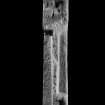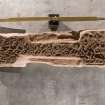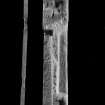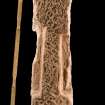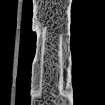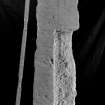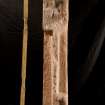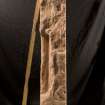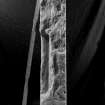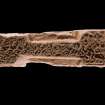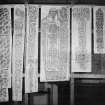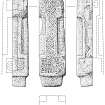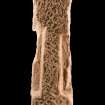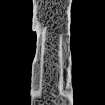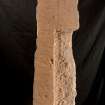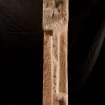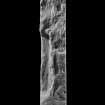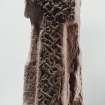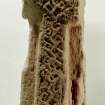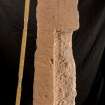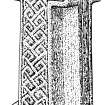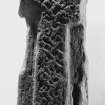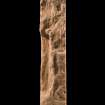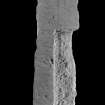Pricing Change
New pricing for orders of material from this site will come into place shortly. Charges for supply of digital images, digitisation on demand, prints and licensing will be altered.
St Vigeans
Carved Stone (Early Medieval)
Site Name St Vigeans
Classification Carved Stone (Early Medieval)
Canmore ID 35567
Site Number NO64SW 3.16
NGR NO 6383 4294
Datum OSGB36 - NGR
Permalink http://canmore.org.uk/site/35567
- Council Angus
- Parish Arbroath And St Vigeans
- Former Region Tayside
- Former District Angus
- Former County Angus
St Vigeans 16 (St Vigianus), Angus, pillar cross fragment
Measurements: H 1.06m, W 0.26m, D 0.16m
Stone type: red sandstone
Place of discovery: NO c 6384 4289
Present location: in St Vigeans Museum (HES).
Evidence for discovery: found ‘many years’ before 1870 and used as a ‘foot step’ for the cross-slab VIG001. Subsequently it was built into the wall of the church and later removed and placed in the porch by 1903. It was taken into St Vigeans Museum in 1960.
Present condition: severely damaged by trimming and very worn. Face C is missing, as is the left-hand side of face D and the right-hand side of face B, and all the edges are damaged. A large sunken mortise has been cut in face C to allow re-use of the stone.
Description
Just over half of this unusual small cross survives in the vertical plane, including its 200mm-long tenon. Each face bears a simple cross in very high relief on a rectangular base, each outlined by wide and plain flat-band borders. On face A the cross is filled with poorly executed diagonal key pattern, while on face B within the cross-head there is a small outline cross with bar terminals to the side arms. Within the surviving portion of the base of the cross on face D is a spiral.
Date range: early medieval.
Primary references: ECMS pt 3, 274-5; Geddes 2017, no VIG016.
Desk-based information compiled by A Ritchie 2017.
Reference (1964)
NO64SW 3.16 6384 4294
No.16. Incomplete pillar with a cross upon a rectangular base in the centre of one face. This pillar was square and is known to have had a similar cross on three sides.
S Cruden 1964






























